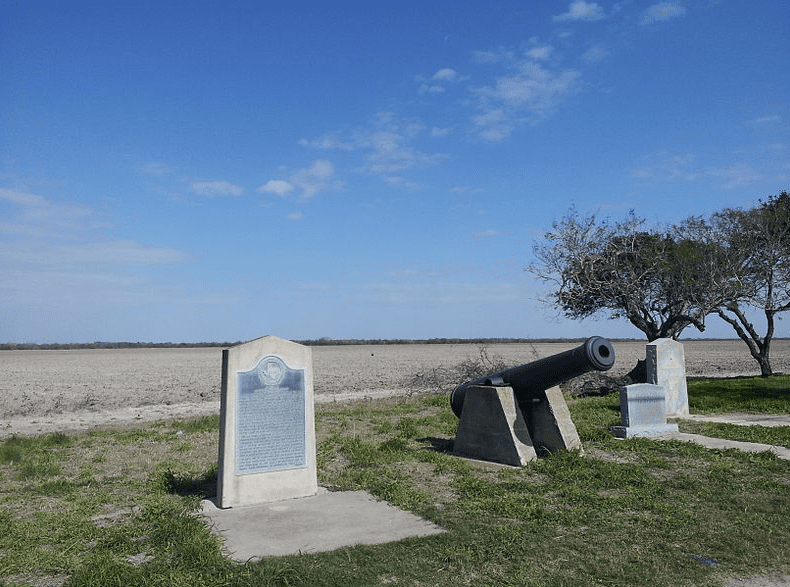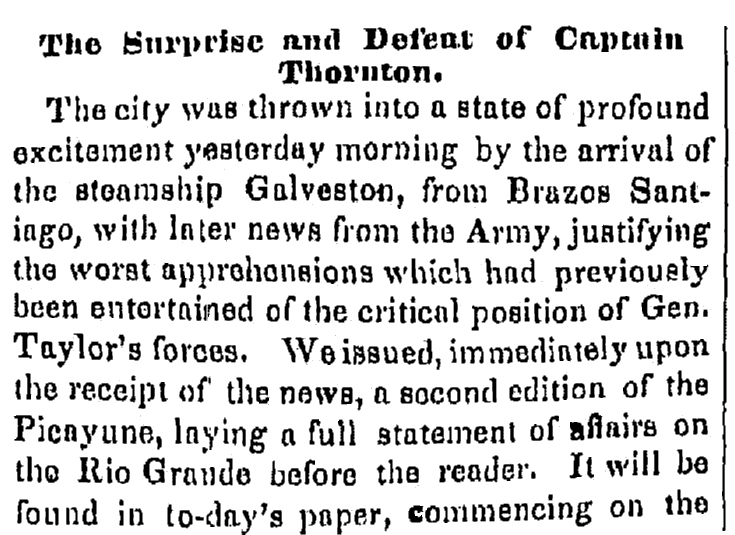On 25 April 1846 the “Thornton Affair,” a clash between Mexican and American troops, provided the spark that caused war. Just 18 days later, on 13 May 1846, Congress declared war on Mexico – beginning the two-year Mexican-American War.

From the Mexican perspective, the war was an act of American aggression, flimsily based on a pretext that Mexico began the hostilities. The United States, on the other hand, claimed that Mexico truly was the aggressor. Which nation is responsible for provoking the war’s bloodshed is disputed to this day.
Mexico regarded Texas as a renegade province even after the Texas Revolution established the Republic of Texas, and warned the United States not to annex the territory. Under the guise of “Manifest Destiny” – the belief that America had a divine right to expand its territory – the United States defied Mexico and admitted Texas into the Union on 29 December 1845. Mexico retaliated by breaking off diplomatic relations.
The United States claimed that the southern border of Texas was the Rio Grande River, ignoring Mexico’s long-established Texas border at the Nueces River 150 miles north. President Polk, a fervent supporter of Manifest Destiny, ordered American troops under General Zachary Taylor to march down to the Rio Grande, ostensibly to “protect” the Texas border, but in reality to cause a provocation – which Mexico provided.
The Americans knew full well that Mexico would consider Taylor’s soldiers to be invading Mexican territory. On 25 April 1846 a detachment of 66 American soldiers, led by Captain Seth Thornton, was out on patrol to see if Mexican troops had crossed the Rio Grande. They had.
Thornton’s men bumped into a force of nearly 2,000 Mexican soldiers. The Americans fought bravely, but were overwhelmed. The Mexican casualties are not known, but 11 of Thornton’s men were killed and the rest – including a wounded Captain Thornton – were captured.
This was all the excuse President Polk needed. On May 11, his message to Congress complained that a belligerent Mexico had “shed American blood upon American soil,” and asked for a declaration of war. Two days later, Congress obliged, and the Mexican-American War was officially underway.
News of the Thornton Affair both alarmed and excited the press and public in the U.S. The following letter is one of the first accounts of the skirmish made public. Although the writer, Lieutenant William S. Henry, got a few details wrong, his letter for the most part is quite accurate.

Here is a transcript of this article:
The Surprise and Defeat of Captain Thornton
The city was thrown into a state of profound excitement yesterday morning by the arrival of the steamship Galveston, from Brazos Santiago, with later news from the Army, justifying the worst apprehensions which had previously been entertained of the critical position of Gen. Taylor’s forces. We issued, immediately upon the receipt of the news, a second edition of the Picayune, laying a full statement of affairs on the Rio Grande before the reader. It will be found in today’s paper, commencing on the first page. But not to omit anything that may relieve the anxiety felt by all to obtain the smallest item of information in regard to the disaster which has overtaken Capt. Thornton and his command, we give place to the following letter direct from the camp. In some particulars, it differs from the statements that have been laid before the public by the press of the city – and particularly, it sets down the loss occasioned by the surprise of Capt. Thornton’s command as less than it is made by any other report we have seen. Other letters which we have from the Army breathe the same calm spirit of determination as Lieut. Henry’s, from which we will no longer detain the reader:
Camp opposite Matamoros, April 26, 1846.
Gentlemen – Knowing that in the present excited state of the public mind as regards our Mexican affairs and the welfare of our little army, that most exaggerated reports creep into the public prints, thereby carrying with them sorrow and anxiety into the bosom of the friends and relations of many officers, I deem it my duty to give you a hasty account of the capture of Capt. Thornton and a squadron of the 2d Dragoons, by a force of 2000 Mexicans under the command of Gen. Torrejon. Gen. Taylor, on the 24th, had received a report that the enemy were crossing the river above this camp. Capt. Thornton, with his command, was sent out on the evening of the 24th to examine the country above, and see whether there was any truth in the report. His command was composed of Capt. Hardee, Lieut. Kane, Lieut. Mason, 5 sergeants, 4 corporals, 1 bugler and 49 privates. His Mexican guide returned this morning, stating that he [i.e., Thornton] had been attacked at 8 o’clock on the morning of the 25th by a large number of the enemy, and that the whole command was captured or destroyed. The guide warned him that he was in the vicinity of the enemy and refused to proceed. He waited until night, and none of the party coming in, he returned home. About 11 this morning a private of the party was brought in in a cart. He was wounded in two places. The man who brought him was the bearer of a note from Gen. Torrejon to Gen. Taylor, the amount of which was that “on the score of humanity he claimed the privilege of sending in to him two dragoons, who were wounded in an engagement brought on by a charge from an American cavalry officer against his command of 2000 men, as he had no [field] hospital.” He then spoke of the rest being prisoners, and said “they would be treated with the consideration due prisoners of war, agreeably to the custom of civilized nations.” From the wounded dragoon we obtain the following facts: That the charge was made in open ground; that when the command “charge” was given, but a few of the enemy were seen, but as they dashed over a hill the whole command presented themselves; they were fired upon, and immediately surrounded and taken prisoners. He does not know what became of Capt. Thornton. Capt. Hardee and Lieut. Mason are prisoners, and are all well. He reports Lieut. Kane as shot, and it is feared he is killed. Ten men were killed. Before the cart left, one of the two men mentioned died. From the note of Gen. T. [i.e., Torrejon], it seems that he accuses Capt. Thornton of having charged upon him. One can hardly conceive of such madness as charging 2000 men with 63, and it is fair to presume that he was surrounded and charged to cut his way through. Time will clear it all up. The capture of Captain Thornton’s party, and sad death of Lieut. Porter, and murder of Col. Cross, are rather melancholy commencements of the war. I say war, for there is no doubt of its existence, and that unless an armistice is signed in ten days, we must have some hard fighting. The enemy are collecting in some considerable numbers, and I think their force may be estimated with safety at 5000. Gen. Taylor is rapidly pushing forward his field work, and I understand has sent for 4000 volunteers – two thousand from Louisiana and two from Texas. If they will give us a fair fight, we do not doubt our ability to whip them; but if they are going to give us a second edition of the Florida war it will be a very annoying affair.
Yours very truly,
W. S. Henry, Lt. U.S.A.
Note: An online collection of newspapers, such as GenealogyBank’s Historical Newspaper Archives, is not only a great way to learn about the lives of your ancestors – the old newspaper articles also help you understand American history and the times your ancestors lived in, and the news they talked about and read in their local papers. Did any of your ancestors serve in the Mexican-American War? Please share your stories with us in the comments section.
Related Articles:
